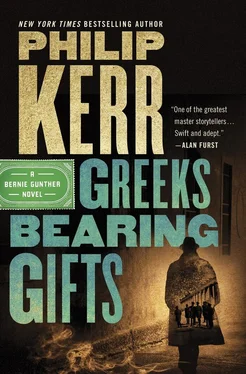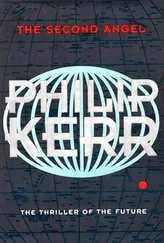“The Grüne Quelle.”
“That’s right. Do you remember the sign on the wall? ‘Roar like a lion roars when you need another shot.’ I could use a glass of that stuff now, couldn’t you, Bernie?”
I didn’t answer but I remembered the bar, all right, and the taste of the brandy. I could even hear the tunes on the pianola, too: “I Kiss Your Hand, Madame,” followed by the Glorious Prussia March and everyone in the bar full of cheap brandy and singing along at the top of their voices. I even found myself recalling the taste of the giant fifty-pfennig steamed sausages they served. I missed it all and more than I cared to admit; I certainly wasn’t about to start reminiscing about the old days with a man who’d just scared off my girlfriend. It was important not to forget, but sometimes it was even better not to remember, to permit the new to overwrite the old.
Merten was still full of talk about old Berlin but because I knew why he was doing it I’d almost stopped listening.
“And surely you remember that little restaurant near the courts? Hessel’s, was it? You’d been giving evidence in a murder case — the Spittelmarket Murders. It was there you gave me the best advice I ever had. About not joining the SS.”
“You should have taken it.”
“But I did take it. I told you, I was just an army captain.”
“Perhaps you didn’t join the SS, Max. And maybe you didn’t kill anyone, like you said. But what you did was as bad as anything any of those others did: Eichmann, Brunner, the whole rotten crew. You lied to all those people in Salonika. You took all their money and all their hopes and then you sent them to their deaths. That’s a terrible thing to have done.”
“Nonsense. Look, the war is history. No one gives a damn about Hitler in Europe. That’s the whole point of this new EEC. So we can all forget about the horrors of the war and become good Europeans instead. Life is one enormous horror, Bernie, and periodically society proclaims its natural fascination with evil and then feels obliged to destroy itself. For the last time, there is no soul, there is no creator, there is merely this poor thing of flesh and blood called man, which, for whatever reason, other men feel compelled to gas and to burn. It’s been happening for centuries. Take my word for it: no one is going to remember the Jews of Salonika in a few years’ time. Hardly anyone remembers them now.”
“You’re wrong about that, too, Max. It was another German, Heinrich Schliemann, who proved that the Trojan War was a real event in history. Homer was writing about it five hundred years after it probably happened. And we’re still talking about it today. It’s the same with the Second World War. This stuff isn’t going away in a hurry. We Germans are stuck with it, like the Greeks and the Trojans were. Whether we like it or not.”
“So what happens now?”
“You’re going to drive us into the center of Athens. To police HQ. And there you’re going to volunteer yourself as a witness in the ongoing trial of Arthur Meissner. After that it’s up to the Greeks what happens.”
“Look, you’re still not thinking straight. Maybe she has gone, but there are plenty more fish in the sea. Think of the gold on that sunken ship. Think how many girls like her you could have with a proper share of that treasure.”
“Maybe you weren’t listening but there is no proper share of money obtained like that, Max. And I just lost the only treasure I was ever likely to have. That’s the nature of real treasure. You just don’t know how precious it is until you lose it. So, drive.” I brushed his earlobe with the sights on the gun. “And please, Max, not another word until we get to police headquarters. If you can keep your mouth shut until then, you stand an even chance of staying alive for the rest of the day.”
Crossing the palatial lobby of the Grande Bretagne Hotel I saw her, seated underneath an enormous gilt mirror, with her back to the wall and facing the main entrance. It was the best place to sit if you wanted to see everyone who was coming in or going out and you were professional about this kind of thing and, given that profession, very serious about staying alive, which I had no doubt she was. On this occasion she was wearing a brown two-piece business suit with square chocolate patent buttons and a little brown beret.
I thought about ignoring her and then decided against it. I thought it unlikely that she was alone and although I couldn’t see him I felt sure one of her more muscular men would have shepherded me to the empty seat beside her. So halfway across the marble floor I checked my walk and went back toward her. She stood and smiled pleasantly as if she’d been an ordinary housewife, there for a more prosaic purpose than revenge and murder, and extended a gloved hand for me to shake, which I did if only to show I was unafraid.
“Where is he?” I asked.
“Who?”
“Your sniper, of course. Behind the potted palm, I suppose. Or hidden among all of those liquor bottles in the bar. Just be careful he doesn’t put the wrong kind of optic to his eye. He’s liable to see things very differently.”
The bandit queen smiled. She was smaller than I remembered and better looking, but not so you’d have wanted to do something about that. Her brown eyes were on me and then on someone I didn’t see, someone over my shoulder who stayed out of sight for the moment. I glanced around but didn’t make him; the lobby was full of largish men in cheap suits attending an air-conditioning convention in one of the hotel’s many conference rooms, and her armed guard could have been any one of them. Now that I was about to renew my acquaintance with the bandit queen I wouldn’t have minded a little extra air myself; just looking at her gave me a tight feeling in my chest, like someone was going to put a bullet in one of my lungs.
“Good idea,” she said. “Alexander’s Bar, I mean.” She glanced at the steel Rolex on her bony wrist. “And not too early, perhaps. So. Let me buy you a drink, Herr Ganz.”
“Sure. Why not? Poison’s more discreet in a place like this.”
“If we wanted to do that you’d be dead already. Trust me on that. We’d have added a secret ingredient to your toothpaste. Radium, probably. That’s standard procedure in these circumstances. Radium adds a whole extra dimension to the idea of tooth decay. They say that victims have the cleanest teeth in the morgue.”
“Maybe I should switch brands. Nivea doesn’t seem to shift tobacco stains very well. But you know, I don’t scare so easily in this place. For one thing I’ve started to carry a gun.”
“You’ve nothing to fear from me, I can assure you.”
“I’m pleased to hear it.”
I followed her into the bar to a table in the quietest corner with a reserved sign and a waiter who was already hovering there, as if he’d been briefed to wait on us with extra vigilance. For all I knew he worked for the Ha’Mossad, too, but I couldn’t have said if he looked Jewish. As a copper who never once took a race education class under the Nazis, I wasn’t much good at identifying Jews. It has to be said that some people do look Jewish but neither the bandit queen nor the waiter did. We sat down and ordered a pair of large whiskeys. She found a packet of Tareytons in a tapestry handbag, lit one, and smoked it with what sounded like a sigh of relief, her first sign of weakness.
“I’m trying to cut down so I make myself wait until I have a drink in my hand before I can light one.”
“That’s not the way to cut down.”
“What would you recommend?”
“You could try having a drink only when you’re celebrating murdering another old Nazi.”
“To be honest we don’t do that anymore. We used to, of course. Grawitz, Giesler. Geschke. Back in the day we were very active all over Europe.”
Читать дальше











